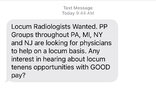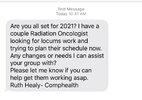My personal take is that things are very regional. "Ties to the area" seem most important in my experience. Whether that's so a practice can build a productive and equal partner or exploit someone with a huge non-compete hoping that some poor new grad won't leave due to their "ties" depends on the practice. Even churn and burn places prefer to replace people as little as possible to maximize profit and save headaches. A lot of academic places hire their own grads for main center or satellites since they are known quantities and there are "ties to the area" benefits for both sides.
If you go to a residency in a less competitive region like upper midwest, desert, southeast (outside of Florida), you will likely have more options coming out of residency in your region. They're less competitive to begin with, and then you have "ties to the area". It's hard to stand out looking for a job when every reasonable publicly advertised job gets 80+ applications, academic places get 40+ cold calls/e-mails per year, and PPs/hospital practices are getting increasing numbers of cold calls ever year since all the residents are being told to start networking early (as if that creates more jobs...). So people take you seriously when you're already in their area since they assume you're in that area for a reason and know the area to whatever extent.
More competitive regions like major metros (especially northeast, but really applies to most of them), Florida, coastal California, etc are a crapshoot. There aren't enough jobs in those areas for the people training there. It's even worse trying to break in from outside those areas.
Prestige and quality of training are unquantifiable. Some people on both the academic and private sides love to hire top tier grads, while others despise them. Big name training is probably a net positive but who knows. Also, training quality... How do you even define this? It seems to me that the most successful people are just the most friendly, competent, and work however hard they need to work for their particular practice environment. Technically are they amazing? Are they just good enough to be board certified? To me, it doesn't seem like it really matters.





 Our group shares the same perspective re: clinical training from probably the same program...
Our group shares the same perspective re: clinical training from probably the same program...
